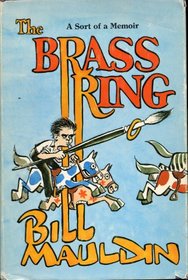An absolutely, uncensored, top-notch read that anyone with an interest in World War II should not miss. Mauldin writes in an easy-going manner that makes the book a joy to read.
Bill Mauldin, America's most widely read editorial cartoonist, has written an autobiographical account of ten years in the life of a cheerful delinquent whose character was formed in such places as a Mexican mining town, an Arizona desert homestead, and a New Mexico mountain apple
farm. He survived a broken home full of loving but combative relatives and came down out of the hills at the age of thirteen in the fourth year of the Great Depression, bearing a drawing tablet which bore but one commandment: "Thou shalt win."
In the course of his next wild decade he became a free-lance sign-painter and was thrown into jail at fifteen while riding a freight train to an assignment as a sports artist for a high-school paper. At seventeen, he made his way to Chicago to study art, drawing magazine gags and washing dishes for meals. As a budding political cartoonist at eighteen, he worked both sides of an Arizona gubernatorial contest, which led logically to a refuge in the army as a volunteer, a year and a half before Pearl Harbor.
Driven by an ambition to achieve recognition as a war cartoonist, he succeeded so spectacularly that General George Patton, infuriated by Mauldin's satire, wanted to court-martial him, while other eminent generals in the field applauded him as a morale-builder and gave him his own jeep for traveling about the front.
On his way to all this, Mauldin spent three years in the infantry, got married, and helped put out an incredible weekly called the 45th Division News, which flouted policy, never printed officers' pictures, and supported itself in Sicily through such devices as stealing zinc coffin linings for engravings.
Eventually assigned to Stars and Stripes, the huge overseas army daily, and reprinted regularly in hundreds of U.S. papers, Mauldin, still a sergeant in uniform, won his first Pulitzer Prize before he was twenty- three, became the youngest biographee in Who's Who, and realized the success he had sought, even as the war and the men who had fought it got under his skin.
Wounded once and scared often, he prowled the foxholes with his pencil, learning new values and maturing from a gag cartoonist to a satirist of such depth and stature that he is still considered the best of all war cartoonists. His career was summed up by an army historian who recently remarked: "There will never be another Mauldin. The Pentagon will never let him happen again."
farm. He survived a broken home full of loving but combative relatives and came down out of the hills at the age of thirteen in the fourth year of the Great Depression, bearing a drawing tablet which bore but one commandment: "Thou shalt win."
In the course of his next wild decade he became a free-lance sign-painter and was thrown into jail at fifteen while riding a freight train to an assignment as a sports artist for a high-school paper. At seventeen, he made his way to Chicago to study art, drawing magazine gags and washing dishes for meals. As a budding political cartoonist at eighteen, he worked both sides of an Arizona gubernatorial contest, which led logically to a refuge in the army as a volunteer, a year and a half before Pearl Harbor.
Driven by an ambition to achieve recognition as a war cartoonist, he succeeded so spectacularly that General George Patton, infuriated by Mauldin's satire, wanted to court-martial him, while other eminent generals in the field applauded him as a morale-builder and gave him his own jeep for traveling about the front.
On his way to all this, Mauldin spent three years in the infantry, got married, and helped put out an incredible weekly called the 45th Division News, which flouted policy, never printed officers' pictures, and supported itself in Sicily through such devices as stealing zinc coffin linings for engravings.
Eventually assigned to Stars and Stripes, the huge overseas army daily, and reprinted regularly in hundreds of U.S. papers, Mauldin, still a sergeant in uniform, won his first Pulitzer Prize before he was twenty- three, became the youngest biographee in Who's Who, and realized the success he had sought, even as the war and the men who had fought it got under his skin.
Wounded once and scared often, he prowled the foxholes with his pencil, learning new values and maturing from a gag cartoonist to a satirist of such depth and stature that he is still considered the best of all war cartoonists. His career was summed up by an army historian who recently remarked: "There will never be another Mauldin. The Pentagon will never let him happen again."





